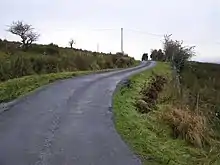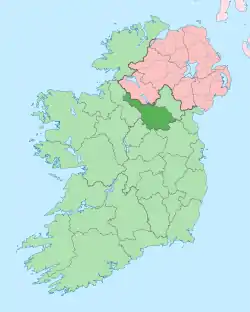Corratawy
Corratawy, an Anglicisation of the Gaelic, ‘Corr an tSamhaidh’ meaning The Round Hill of the Sorrel Herb, is a townland in the civil parish of Templeport, County Cavan, Ireland. It lies in the Roman Catholic parish of Glangevlin and barony of Tullyhaw. The local pronunciation is Curratavy.[1]

Geography
Corratawy is bounded on the north by Derrylahan townland, on the west by Drumhurrin and Lattone townlands and on the east by Creea and Edenmore townlands. Its chief geographical features are Carricknahurroo Lough,[2] Drumhurrin Lough, Corratawy Lough, mountain streams, woods, dug wells and spring wells. The townland is traversed by the regional R206 road (Ireland), minor public roads and rural lanes. The townland covers 346 statute acres.[3]
History
In earlier times the townland was probably uninhabited as it consists mainly of bog and poor clay soils. It was not seized by the English during the Plantation of Ulster in 1610 or in the Cromwellian Settlement of the 1660s so some dispossessed Irish families moved there and began to clear and farm the land.
A deed dated 10 May 1744 spells the name as Currawtawny.[4]
The 1790 Cavan Carvaghs list spells the name as Cortawy.[5]
The Tithe Applotment Books for 1826 list four tithepayers in the townland.[6]
The Corratawy Valuation Office Field books are available for July 1839.[7][8]
Griffith's Valuation of 1857 lists seven landholders in the townland.[9]
The landlord of Corratawy in the 19th century was William Blachford.
Census
| Year | Population | Males | Females | Total Houses | Uninhabited |
|---|---|---|---|---|---|
| 1841 | 64 | 23 | 41 | 10 | 0 |
| 1851 | 61 | 29 | 32 | 8 | 0 |
| 1861 | 57 | 29 | 28 | 9 | 0 |
| 1871 | 58 | 27 | 31 | 9 | 0 |
| 1881 | 59 | 28 | 31 | 8 | 0 |
| 1891 | 60 | 31 | 29 | 8 | 0 |
In the 1901 census of Ireland, there are nine families listed in the townland.[10]
In the 1911 census of Ireland, there are nine families listed in the townland.[11]
Antiquities
- A sweathouse. The 'Archaeological Inventory of County Cavan' (Site no. 1865), describes it as- Marked on OS 1836 and 1876 eds. Situated 180m NE of Drumhurrin Lough. In the early decades of this century it was dismantled and the stones utilised as building material for field boundaries in the vicinity (local information). No visible remains at ground level.
- Stone bridges over the rivers
- Lime-kilns
- Corratawy National School, Roll No. 13,702. The school was opened in January 1890 by the parish priest, Father Thomas Corr, as one of the replacements for closed old schools in the parish. There were 132 pupils in the school in 1890.[12] Local folklore was collected in 1938 by the pupils of the school.[13] The school was closed in the mid-1960s.[14]
References
- "Placenames Database of Ireland". Retrieved 29 February 2012.
- "Carricknahurroo Lough".
- "IreAtlas". Retrieved 29 February 2012.
- "Memorial extract — Registry of Deeds Index Project".
- A List of the Several Baronies and Parishes in the County of Cavan Cavan Library
- Archived copy Archived 24 April 2018 at the Wayback Machine Tithe Applotment Books 1826
- Ireland Census National Archives
- Ireland Census National Archives
- - Griffith's Valuation askaboutireland.ie
- Census of Ireland 1901
- Census of Ireland 1911
- "THE CORRATAWY NATIONAL SCHOOL. (Hansard, 15 May 1893)". Archived from the original on 27 March 2019. Retrieved 14 March 2019.
- "Curratavy | the Schools' Collection".
- "Corratavey Old School house Glangevlin Co Cavan".
